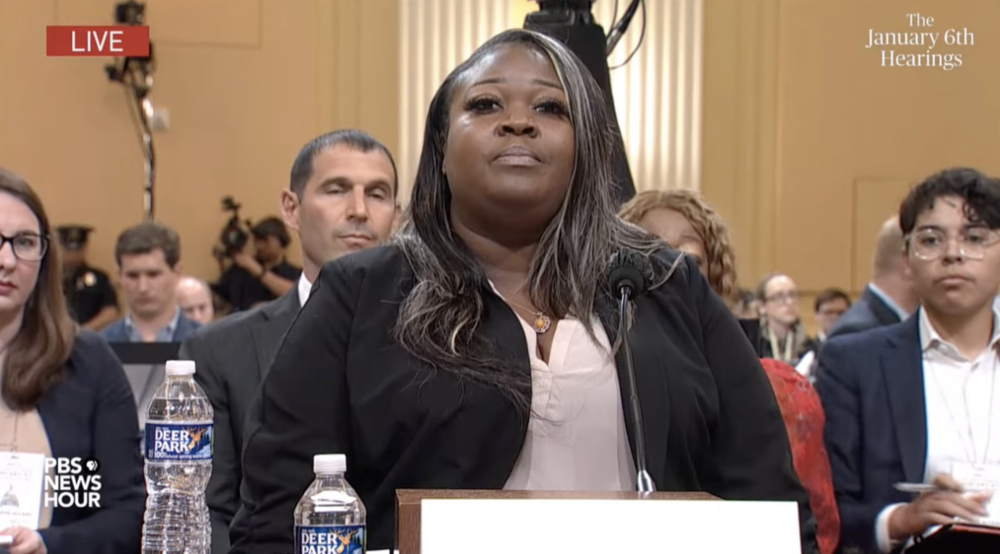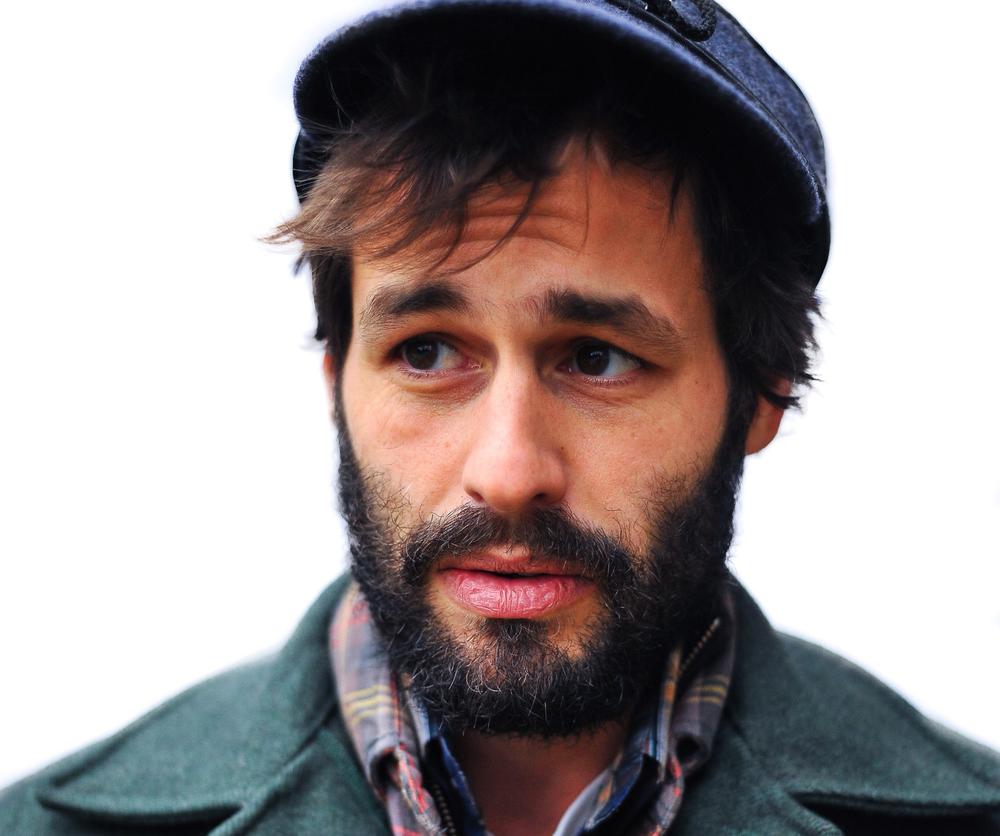
Section Branding
Header Content
Georgia Today: Moss testifies in Giuliani trial; Rabbi opens Senate; Conglomerate era publishing
Primary Content
On the Tuesday, Dec. 12 edition of Georgia Today: A Georgia election worker testifies that she feared for her life as the defamation trial against Rudy Giuliani continues; an Atlanta rabbi delivered the opening prayer in the U.S. Senate today; a Georgia professor looks at how the “conglomerate era” of publishing changed the American novel.

Peter Biello: Welcome to the Georgia Today podcast from GPB News. Today is Tuesday, Dec. 12. I'm Peter Biello. On today's episode, a Georgia election worker testifies that she feared for her life as the defamation trial against Rudy Giuliani continues. An Atlanta rabbi delivered the opening prayer in the U.S. Senate today, and a Georgia professor looks at how the conglomerate era of publishing changed the American novel. These stories and more are coming up on this edition of Georgia Today.

Story 1:
Peter Biello: A Georgia election worker has testified that she feared for her life and still suffers from panic attacks after she received a barrage of threatening and racist messages fueled by conspiracy theories spread by former Donald Trump attorney Rudy Giuliani. Shaye Moss took to the witness stand today in a Washington, D.C., trial over how much Giuliani will have to pay Moss and her mother for years of falsely accusing them of election fraud. Earlier in the day, the judge admonished Giuliani after Giuliani last night repeated his false claims that Moss and her mother, Ruby Freeman, changed votes at an Atlanta polling location during the 2020 presidential election.
Story 2:
Peter Biello: The governors of Georgia and Alabama have announced an agreement in a long-running lawsuit over water flows from the Chattahoochee River. Gov. Brian Kemp and Gov. Kay Ivey today both characterized the deal as a win-win for business and recreation on both sides of the border. The agreement provides objectives for river flow, including withdrawals in the Atlanta area and levels at Southwest Georgia's Lake Seminole.

Story 3:
Peter Biello: Early next year, Georgians will have access to a new tool that makes the cost of health care more transparent. It's a statewide database of insurance claims. GPB's Sofi Gratas has more.
Sofi Gratas: Georgia will soon join about half of all states that already have an all-payer claims database or an APCD. These portals use de-identified insurance claims to make average costs public for things like ambulances, labor and delivery, dentistry and medicine for chronic diseases. This will be the largest source of aggregate health care data in the state, says John Duke, with Georgia Tech's Center for Health Analytics and Informatics, which helped develop the APCD.
John Duke: The goal would be let me look at my county, let me look in my area compared to other areas, let me try to get a better understanding of the health in that environment from what is available in claims.
Sofi Gratas: Unlike public health data, the app will be updated every few months rather than annually. For GPB News, I'm Sofi Gratas.
Story 4:
Peter Biello: The Southern Poverty Law Center has taken a crucial step toward setting up shop in Atlanta's West Side. The Alabama-based nonprofit dedicated to social justice closed last week on a two-and-a-half acre parcel in Atlanta's West Side English Avenue neighborhood. CEO Margaret Wang says they chose the west Side for its new Atlanta office to center itself in a community it works alongside. The SPLC says it plans to begin site improvements immediately, including updating access to the Atlanta BeltLine Connector Trail and investing in new sidewalks. The new campus will eventually include space that will be designed to support education opportunities and local entrepreneurs.
Story 5:
Peter Biello: The racketeering conspiracy trial of Atlanta rapper Young Thug and five other people is now on pause until Jan. 2. The judge in the case today dismissed jurors for their holiday break three days early after one of the defendants was stabbed multiple times Sunday in a fight with another detainee at the Fulton County Jail. The trial is already the state's longest criminal trial. It started in November after ten months of jury selection.
Story 6:
Peter Biello: An Atlanta rabbi delivered the opening prayer in the U.S. Senate today. Georgia's Sens. Jon Ossoff and Raphael Warnock introduced Peter Berg of the Temple in Midtown Atlanta.
Peter Berg: Tonight, Jews all around the world will light the sixth candle of Hanukkah. We will do so in a world that is teeming with xenophobia and hatred. Let us never forget that this is a time of year where we all bring light and hope to despair and to darkness.
Peter Biello: Ossoff said Berg's leadership comes at an important time for Jewish-Americans. Berg served as the guest chaplain for the day, a Senate practice that dates back to at least 1857.

Story 7:
Peter Biello: Officials in Macon Bibb County have worked out a plan to open extra beds for unhoused residents during cold weather snaps. GPB's Grant Blankenship reports the plan comes after a local homeless shelter changed its housing priorities earlier this year.
Grant Blankenship: Macon-Bibb Mayor Lester Miller criticized the local Salvation Army shelter when it recently shifted focus to families and military veterans at the exclusion of single adults. And cold weather has killed people sleeping in Macon streets in past years. Now, Macon's homeless service providers have a winter plan. When nighttime forecasts call for at least three hours below freezing, both Salvation Army and United Way shelters across town will set out emergency beds. The challenge is communicating the day's rules to people who need shelter, like Michael Curtis.
Michael Curtis: When one person finds out it spreads through the street, but usually with someplace like the Salvation Army, because there's so few beds, by the time word gets out, the beds' pretty much full.
Grant Blankenship: Macon-Bibb county is slated to perform its first-ever independent homeless census next year. For GPB News, I'm Grant Blankenship in Macon.
Story 8:
Peter Biello: Georgia's economy will slow down next year, but not enough to create a recession. That's the forecast from Ben Ayers, the dean of the University of Georgia's Terry College of Business. Ayers presented the state's annual economic outlook in Atlanta yesterday, the first of eight forecast presentations statewide through February.
Story 9:
Peter Biello: The former president and CEO of Southern Co. is stepping down from his role on the company's board of directors. The Atlanta-based energy giant said today Tom Fanning will retire at the end of the year. Fanning stepped down as president and CEO earlier this year, handing over leadership to Chris Womack, the first Black man to lead the company. Fanning's departure from the board ends 43 years of positions that he's held with Southern Co..

Story 10:
Peter Biello: Residents in rural East Georgia's Jenkins County are set to get some relief from railroad crossings that hinder business and other movements around the county seat of Millen. White House infrastructure coordinator Mitch Landrieu says $12 million in funding from the bipartisan infrastructure law will pay for the construction of three grade-separated rail crossings.
Mitch Landrieu: Folks that live in rural areas know how difficult rail crossings are for a bunch of different reasons. They're unsafe. They cause a pain in the butt by having to wait for a really, really long period of time and it interrupts economic flow. And of course, people's lives and just getting to and from. And so this is a fairly significant investment.
Peter Biello: The Jenkins County projects were part of more than $645 million in nationwide rural transportation funding announced today. The White House says 10 trains a day traveling an average of 10 miles an hour, delay traffic around Millen.
Story 11:
Peter Biello: Students from across metro Atlanta will meet with professional gaming industry experts for a festival focused on women in e-sports. GPB's Amanda Andrews has more on tomorrow's event.
Amanda Andrews: The Girl Gamer Atlanta Festival is hosting students, parents, teachers and several women's e-sports teams for the one day conference. Students will watch the teams compete in Rocket League, participate in STEM workshops, and hear about gaming careers from panelists. Skill Shots CEO Todd Harris helped organize the event. He says this is about showing children the futures they could have in the world of gaming.
Todd Harris: So being a Twitch streamer is one path, but there are many, many other paths, like being a computer programmer or being a digital artist or an animator or again, managing social media.
Amanda Andrews: The festival gets underway at 8 a.m. For GPB News, I'm Amanda Andrews in Atlanta.
Story 12:
Peter Biello: Day 2 of the Georgia High School Football championships are underway at Mercedes-Benz Stadium. The Greenbrier Wolfpack took home the Division 2 flag football championships today over defending champ Lithia Springs. GPB's Jon Nelson givse us a recap of day one of the championships.
Jon Nelson: Fantastic nightcap in Night no.1 with Manchester and Bowden. They played each other in Week 1; it was a one-point game. Played each other to finish up Day 1. It was a one-point game. Bowden goes back-to-back state champs and all of our heart and all of our love goes to everybody in Manchester, with what they have been going through as a community for the last handful of days. Before that, it was a Class A D-1: Aaron Philo for Prince Avenue sets a record for most passing yards in a career in high school football in the state of Georgia. And he also ties a record four TDs in a season. So Prince Avenue has now won three out of four, if my memory serves. So once again, great win for PAC. Swainsboro makes it to the last game of the year. Had one of the most dominant performances by an athlete I've seen. DeMello Jones heading to Georgia. 26 points on the night. Four touchdowns and a two-point conversion for Swainsboro. And then history in Flag to start our day. Southeast Bulloch has now won 62 in a row. Fantastic stuff from our friends in Brooklet. And they won the first flag football championship. So three championships down, four more to go on Tuesday. Four more on Wednesday. So watch on GPB. Be a part of it all across the GPB plethora of networks pretty much wherever you see GPB, GPB Sports, we're there.

Story 13:
Peter Biello: If you've been to a bookstore lately, you were likely searching for a particular title or author, but another name on the book. The publisher, is also worth noting because publishers decide what's available for you to read. Over the past 70 years or so, a growing number of publishing houses have put an increased emphasis on profit. And that has changed the way writers write and readers read, says Emory professor Dan Synikin. In Big Fiction: How Conglomeration Changed the Publishing Industry and American Literature. Sinykin breaks down the broader impact of large corporations. And he's with us now.
Dan Sinykin: Thanks so much, Peter.
Peter Biello: So this book is about what you call the "conglomerate era" of publishing, and you start writing about it from the perspective of the industry in about 1959. What were the conditions like then?
Dan Sinykin: The publishing industry looked very different than it does today. Back then, there were many smaller independent publishing houses. They were typically owned by the founders or the heirs of the founders, and they were more properly what we would think of as a publishing house. The environment was somewhat familial, hierarchical and relatively small. And that started to change in the 1960s when bigger companies started to buy up and centralize the industry.
Peter Biello: And as that process played out through the 1960s and '70s, what happened to fiction of all types?
Dan Sinykin: So if you were a publisher in the 1970s, you had a couple pressures that were put upon you. You had new owners who were asking for you to increase your shareholder value and suddenly asking you for quarterly growth. So what do you do? You have to figure out ways to predict what people are going to want to buy so that you can make more money selling it. There are two techniques that mass market publishers used in particular to predict sales. One was to expand the marketing department that was once quite a bit smaller and make these big baroque publicity campaigns to support new mega-bestseller brand names like Danielle Steel, Stephen King, or in the 1980s, Tom Clancy or John Grisham. The other thing that they could do with genre was to follow the Harlequin model. This was a small Canadian publishing company that devised techniques to make these formulaic romance novels that were predictable enough that people would recognize the brand name Harlequin, and the company could pay a small amount of money to hack writers who would then churn out these formulaic fictions and write them in these series one after another so that people would buy one and then keep buying all of them from the series. This was taken up by a number of publishing companies in the '70s and '80s, especially in the genre of romance and the new mass market genre that didn't properly exist previously of fantasy. And fantasy and romance are the biggest, hottest genres of 2023. This is all the product of the conglomeration of publishing from the '70s and '80s.
Peter Biello: Let me ask you about the nonprofit sector, because as conglomeration took hold, nonprofits kind of filled in a gap that — that those on the literary end of things really felt they needed. The books that weren't likely to become bestsellers but were really well-written, really artful. How did nonprofits carve out a space for themselves?
Dan Sinykin: So in the late 1970s, there was a feeling going around that these increasing demands for quarterly growth were going to kill off literary books. And so one idea that a guy named Jim Sitter up in Minnesota had was: What if we follow a path taken by the symphony or the opera and get foundations and philanthropists and the government to subsidize publishing? That way there can be a little bit of freedom from the free market. So Jim Sitter started to figure out who had the money and what a good place would be to support this kind of infrastructure. And Minnesota had a lot of folks who were already supporting the arts. And so he drew publishers from Washington State, a guy named Scott Walker, who was running a little outfit called Graywolf, and Allan and Cinda Kornblum, who were running a little press down in Iowa City, Iowa, and had them come up. And both Walker and the Kornblums filed as nonprofits and the Kornblums started Coffee House Press. And they envisioned themselves has resisting conglomeration, resisting New York City, where all the big presses were located and creating a home for different kinds of writing that might not make it solely on the demands of the market.
Peter Biello: So you've got nonprofits and conglomerates. Nonprofits: mission-driven. Conglomerates: driven by profit. And then there's W.W. Norton, which is a big name. You may remember your college survey course where you had a giant Norton Anthology of literature. How did Norton carve out a space that's neither conglomerate nor nonprofit?
Dan Sinykin: W.W. Norton is a great story, and it's because of a couple of historical accidents. The guy who founded the company, whose name was W.W. Norton, died relatively young and his wife had to decide what to do with the company, and she decided to sell it to the employees, making it an employee-owned cooperative. So that's the first thing. And the second thing is that, as you said, Peter, W.W. Norton has an unusual relationship to higher education. It developed an anthology series that has become enormously popular in English departments as well as a series of critical editions of classic novels that are widely put to use. And so its college division functions something like a foundation or a philanthropist at a nonprofit. It gives it a little bit of a buffer to do some more creative things on the trade side where it publishes its fiction and poetry.
Peter Biello: I'm thinking Chuck Palahniuk's Fight Club, Trainspotting [by Irvine Welsh], weird books that that may not have found a place elsewhere.
Dan Sinykin: So right. In the 1990s, there was a great editor named Gerry Howard who found himself at Norton and used that freedom that Norton had to do books that didn't quite fit either the conglomerates or the nonprofits, books that might never have been published otherwise. So here's where you get someone like Walter Mosley with Devil in a Blue Dress. This is where Patrick O'Brien's immensely popular sailing novels (Master and Commander was the inaugural one), which had been published a couple of times before in the U.S. and it failed. This was the third try. No one else was going to try, but W.W. Norton could do weird things. And so they published those books to immense success as well as, yes, Trainspotting, Fight Club. These books might not have had a chance in the United States, hadn't it been for Norton, which had this unusual setup where it was independent, had a little bit of buffer, had a little bit freedom to do the oddballs, the misfits, publish kind of stranger books.
Peter Biello: But what it seems like you're saying is that, you know, for a reader who's looking for something they can't find easily, you know, at the front table, at their local bookstore or even at a Barnes and Noble, you got to do a deeper search, perhaps to find something unusual and challenging and fun.
Dan Sinykin: The great thing about these small, nonprofit independent presses that are thriving in our current moment is that they do do wilder stuff. They keep a wilder vision of American literature alive. And it's out there if you look for it. And I think these places are finding their readerships on social media. And it's great to see there's variety of ways in which this is done.
Peter Biello: And I will say too: I don't want to give the impression that bookstores don't carry any of these things. What I will say, though, is that it seems to me that what we see in the bookstores, most bookstores anyway, is really just the tip of the iceberg. Most of it is under the surface.
Dan Sinykin: Yeah, I would encourage people to pay attention to the publisher who's publishing the books you're getting and know that those big conglomerate publishers, there's just five of them that control something like 80% of the world of publishing these days. And there's a lot of imprints that are contained within those big five. And those big five really hold a great deal of sway over marketing and publicity in terms of the books that are likely to win big awards, the ones that are going to get on all the big lists of people's top 20 books of the season or Time's top books of the season. It's because those big publishing companies have a lot of money to market them that they're the ones that are more likely to get in front of your eyes. So I'd encourage folks to just try a little bit harder to find the books that are just — just kind of flying under the radar, but doing exciting things.
Peter Biello: So much to read, so little time. Dan Sinykin, thank you so much for speaking with me. I really do appreciate it.
Dan Sinykin: It is my pleasure.
Peter Biello: Emory professor Dan Sinykin is the author of Big Fiction: How Conglomeration Changed the Publishing Industry and American Literature.
And that's it for this edition of Georgia Today. If you want to learn more about any of these stories, visit GPB.org/news. And if you've got feedback for us, we'd love to hear from you. Email us. The address is GeorgiaToday@GPB.org. Now's a good time to subscribe. We'll be back in your podcast feed tomorrow. I'm Peter Biello. Thanks again for listening. We'll see you then.
---
For more on these stories and more, go to GPB.org/news



